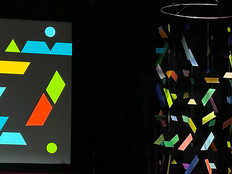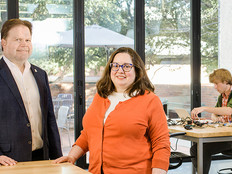The Power of the Pandemic for Digital Transformation
The pandemic highlighted existing inequities regarding access to digital tools, also known as the “digital divide,” explains Kendrick Brown, provost and senior vice president of academic affairs at Morehouse. The past several years have also shown society’s great dependence on technology, Brown says.
“When I think about the role of emerging technology and the need for infrastructure, I think about the need that HBCUs in general have for infrastructure,” he says. “There’s been a general underdevelopment of HBCUs, like Morehouse. But to be able to build that infrastructure, to have that equipment, to have that capability, that levels the field and provides opportunities for learning and for a better society.”
Brown also says the renewed focus on supporting HBCUs is tied to the rise in collective awareness of the “structural inequalities in society” over the past few years.
Without the right infrastructure, there’s no foundation for the capabilities that emerging technology like virtual reality can offer students. More corporations, nonprofit organizations, government agencies and funding bodies are connecting with HBCUs to provide support when they launch a new technology: equipment, high-speed internet access and storage.
“If we can bring Black people and people of color into this space as creators, contributors and learners — not just as consumers — then we have an opportunity for authorship and authenticity in a way that otherwise doesn’t happen,” Brown says.
EXPLORE: How esports increases enrollment and funding for HBCUs.
The Importance of Engagement in Retention
At Fisk University, a private HBCU in Nashville, Tenn., VR in the classroom is still relatively new. The university partners with other institutions so students can fulfill required courses and electives that Fisk might not offer. With the adoption of VR, leaders at Fisk hope students will eventually be able to complete all classes at their university, explains Steve Damo, assistant professor of chemistry at the school.
Fisk has long been using VR in research labs, but it transitioned to offering it as part of in-class experiences in fall 2021 through a partnership with HTC VIVE, T-Mobile and VictoryXR. In Damo’s chemistry classes, students can visualize how atoms in a protein are arranged, he says. This insight helps students with pharmaceutical drug research. The university is also enhancing their pre-med program with VR cadavers.
“VR technology offers the development of visual-spatial skills,” says Damo. “It’s an important part of STEM curriculum that often doesn’t receive a lot of explicit attention.”
When a student is actively participating in lessons, engaging with material in new and exciting ways, and taking advantage of the technology available to them, there’s an opportunity for greater learning, retention and innovation — and a commitment to the program.












